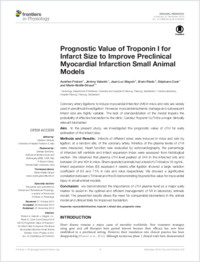Prognostic value of troponin I for infarct size to improve preclinical myocardial infarction small animal models
- Frobert, Aurélien Cardiology, Department of Medicine, University of Fribourg and Hospital of Fribourg, Switzerland
- Valentin, Jérémy Cardiology, Department of Medicine, University of Fribourg and Hospital of Fribourg, Switzerland
- Magnin, Jean-Luc Central Laboratory, Hospital Fribourg, Switzerland
- Riedo, Erwin Central Laboratory, Hospital Fribourg, Switzerland
- Cook, Stéphane Cardiology, Department of Medicine, University of Fribourg and Hospital of Fribourg, Switzerland
- Giraud, Marie-Noëlle Cardiology, Department of Medicine, University of Fribourg and Hospital of Fribourg, Switzerland
-
27.11.2015
Published in:
- Frontiers in Physiology - Clinical and Translational Physiology. - 2015, vol. 6, p. 353
English
Coronary artery ligations to induce myocardial infarction (MI) in mice and rats are widely used in preclinical investigation. However, myocardial ischemic damage and subsequent infarct size are highly variable. The lack of standardization of the model impairs the probability of effective translation to the clinic. Cardiac Troponin I (cTnI) is a major clinically relevant biomarker.Aim: In the present study, we investigated the prognostic value of cTnI for early estimation of the infarct size.Methods and Results: Infarcts of different sizes were induced in mice and rats by ligation, at a random site, of the coronary artery. Kinetics of the plasma levels of cTnI were measured. Heart function was evaluated by echocardiography, the percentage of infarcted left ventricle and infarct expansion index were assessed from histological section. We observed that plasma cTnI level peaked at 24 h in the infarcted rats and between 24 and 48 h in mice. Sham operated animals had a level of cTnI below 15 ng/mL. Infarct expansion index (EI) assessed 4 weeks after ligation showed a large variation coefficient of 63 and 71% in rats and mice respectively. We showed a significative correlation between cTnI level and the EI demonstrating its predictive value for myocardial injury in small animal models.Conclusion: we demonstrated the importance of cTnI plasma level as a major early marker to assist in the optimal and efficient management of MI in laboratory animals model. The presented results stress the need for comparable biomarkers in the animal model and clinical trials for improved translation.
- Faculty
- Faculté des sciences et de médecine
- Department
- Médecine 3ème année
- Language
-
- English
- Classification
- Medicine
- License
-
License undefined
- Identifiers
-
- RERO DOC 258391
- DOI 10.3389/fphys.2015.00353
- Persistent URL
- https://folia.unifr.ch/unifr/documents/304832
Statistics
Document views: 104
File downloads:
- pdf: 186
